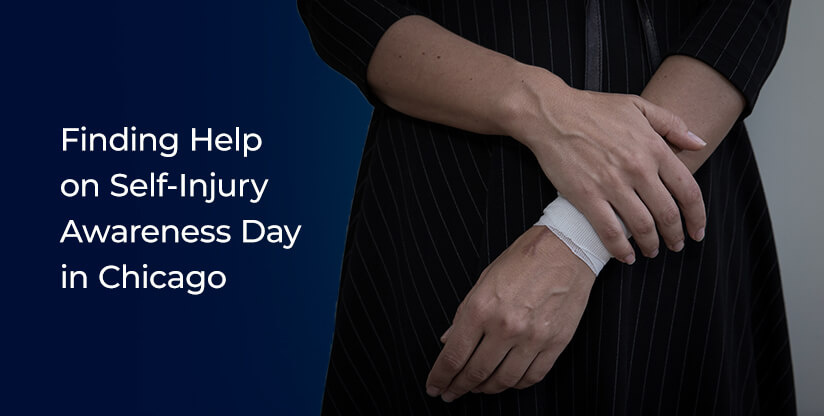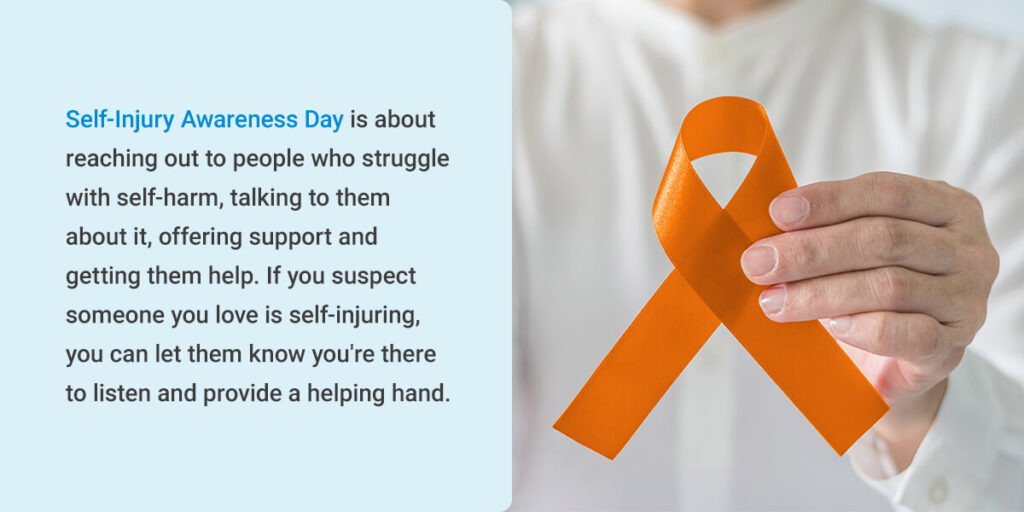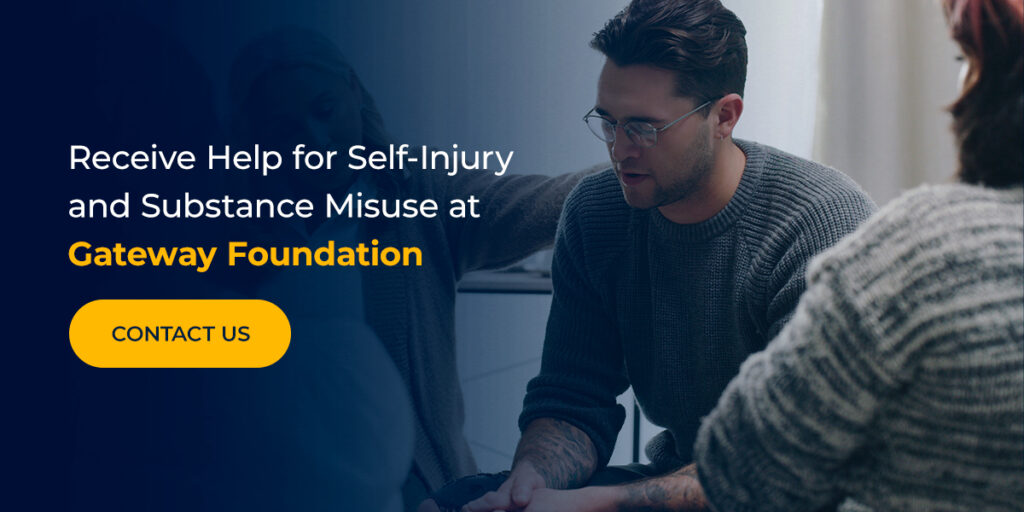- Mar 6
- Addiction TherapyAlcohol Addiction Treatment

Millions of people in the U.S. struggle with mental health, but less than half receive the help they need. Mental health problems often result in behaviors like substance misuse, sleep problems, emotional outbursts, weight or appetite changes, and isolation. In some cases, they can also lead to cutting and self-inflicted harm.
Self-injury is more common than many people realize, mainly because those who struggle with it tend to hide this behavior. It’s essential to bring awareness to this topic, inform others about it and offer help to those dealing with self-harm. That’s the idea behind Self-Injury Awareness Day.
If you or someone you know struggles with a mental health disorder, engages in substance misuse, or uses self-harm as a coping mechanism, getting help is crucial. Learn more about Self-Injury Awareness Day and how to find the treatment you or a loved one needs.
What Is Self-Injury?
Self-injury — also called self-harm or self-mutilation — is the act of intentionally hurting or injuring yourself. It can involve any of the following behaviors:
- Biting
- Cutting
- Pinching
- Scratching
- Binge drinking
- Bone-breaking
- Pulling out hair
- Self-medicating
- Ingesting chemicals
- Burning or branding
- Hitting or punching walls
- Picking skin or reopening wounds
- Excessive body tattooing or piercing
People who engage in self-harm typically do it alone instead of around other people. They may also attempt to conceal their behavior and injuries. Most self-mutilations occur on the thighs, stomach, arms, and wrists, where people can hide wounds easily.
Self-injury and suicide attempts aren’t the same thing. Self-harm is typically non-lethal — however, incidents like contracting an infection or cutting too deep can result in death. People who engage in self-harm can experience suicidal thoughts or may have attempted it at some point.
Why Do People Self-Injure?
Self-injury is often used as a coping mechanism for emotional pain or stress. Many emotions — such as loneliness, worthlessness, anxiety, guilt, anger, and insecurity — can all trigger self-injury. Difficulty understanding, expressing, or controlling these negative feelings may lead to self-harm.
Generally, people who engage in this behavior are looking for a way to punish themselves, release tension or distract themselves from problems they’re experiencing. Additionally, mental health struggles like depression can cause feelings of numbness, and individuals may experiment with cutting or other forms of self-harm to feel something.
In some cases, self-harm can also be a way to manipulate or punish someone else. For instance, people might cut or harm themselves when they don’t get what they want from another person.
Some other reasons for self-injury can include the following:
- Conveying internal emotions in an external way.
- Communicating feelings of depression, stress, or anxiety to others.
- Creating a sense of relief or control over your body, feelings, or stressful situations.
What Are the Symptoms of Self-Injury?
The following signs, habits, and behaviors can indicate self-harm:
- Low self-esteem
- Problems at work, school, or home
- Difficulties with interpersonal relationships
- Frequently picking or scratching at the skin
- Frequently isolating themselves from social settings
- Unexplained cuts, scars, burns, bruises, or scratches
- Spending long durations in a locked bathroom or bedroom
- Intense, impulsive, or temperamental behaviors and emotions
- Keeping objects like knives, blades, scissors, or lighters on hand
- Verbally communicating feelings of helplessness or worthlessness
- Attempting to cover skin, such as wearing pants or long sleeves, even in hot weather
Self-Harm Risk Factors
While anyone can display warning signs of self-harm, the following factors commonly contribute to this behavior:
- Having friends who self-injure
- Excessive alcohol or drug use
- Traumatic life experiences like bullying, abuse, neglect, and sexual or physical assault
- Mental health conditions like anxiety, depression, post-traumatic stress disorder (PTSD), and borderline personality disorder
While self-injury isn’t always associated with substance misuse, it’s common to see these behaviors intertwined. Both self-harm and substance misuse are used as coping mechanisms or temporary escapes from negative emotions.
Some common warning signs and symptoms of substance use disorder include:
- Bloodshot eyes.
- Poor personal hygiene.
- Irritability and mood swings.
- Dramatic weight loss or gain.
- Lack of interest in things once enjoyed.
- Constant withdrawal from friends, family, work, and social situations.
- Complexion changes like paleness, jaundice, acne, scabs, bruises, and scars.
- Signs of financial distress, like constantly borrowing money or selling belongings.
If you notice these behaviors in yourself or a loved one who engages in self-harm, their self-injury habits may be linked to drugs or alcohol. Some people begin with substance misuse and gravitate toward self-harm, while others start with self-injury before shifting to substance misuse.

What Is Self-Injury Awareness Day?
Self-Injury Awareness Day, sometimes called Self-Harm Awareness Day, is a yearly international event to bring awareness to self-harm. Schools, treatment facilities, community centers, and other organizations worldwide recognize this day to bring light to the condition and its impact.
Many organizations host events with seminars and speakers to educate others on the topic. They may hold in-person or virtual campaigns, providing resources for those struggling with self-injury.
Self-Injury Awareness Day is about reaching out to people who struggle with self-harm, talking to them about it, offering support, and getting them help. If you suspect someone you love is self-injuring, you can let them know you’re there to listen and provide a helping hand.
Express your concerns about their behaviors, but ensure you do so in a nonjudgmental way. If they’re comfortable enough to discuss their situation with you, you can help them find the professional support they need.
When Is Self-Injury Awareness Day?
Self-Injury Awareness Day occurs annually on March 1. However, some people also choose to campaign, spread resources and raise awareness of this condition in the weeks leading up to it. For instance, they might wear an orange ribbon representing self-harm awareness.
Some write “LOVE” or draw a semicolon on their arms, symbolizing a continuation of life and mental health awareness. People who engage in self-injury may find inspiration from Butterfly Project and draw a butterfly where the harming occurs. Others may wear a beaded bracelet or wristband to promote awareness.
Here are some other ways to show your support on Self-Injury Awareness Day:
- Wear orange.
- Organize or attend an event near you.
- Start a conversation to educate others on the topic.
- Learn about self-harm or seek help if you struggle with it.
- Share your story on social media with the hashtag #SelfInjuryAwarenessDay.
- Explore the connection between substance misuse and self-harm, learning how to recognize the signs of both behaviors.
How to Find Help in Chicago on Self-Injury Awareness Day
If you or someone you love is exhibiting characteristics of self-harming and substance misuse, it’s critical to seek treatment and get the help you need. At Gateway Foundation in Illinois, we specialize in research- and evidence-based therapy by experienced medical professionals and psychiatrists.
We offer various cost-effective programs and services designed to drive results. Our compassionate staff can tailor a treatment plan to the unique situation and needs of your loved one or yourself. Services at our Mental Health Treatment Centers include medication-assisted treatment, psychotherapy, dual diagnosis treatment, and ongoing support to prevent relapse.
By getting in touch with our center, you can find the support and treatment plan you or your loved one needs. Let us help you get to the root of your self-injury and substance misuse and overcome these obstacles.
Receive Help for Self-Injury and Substance Use Disorder at Gateway Foundation
Remember that no one has to struggle with self-harm and substance use disorder alone, and help is never far away. We have over 50 years of industry expertise in Illinois, a caring staff, evidence-based treatments, and a multitude of programs to fulfill every patient’s needs, so you can always lean on Gateway for support.
We can help you or a loved one address the source of co-occurring substance misuse and self-harm, paving the road to recovery and a better quality of life. Even after you complete therapy, we’ll continue to extend any support or resources you may need. Our team is with you for life. Contact our center today to learn more about our mental health services or begin your treatment process.



